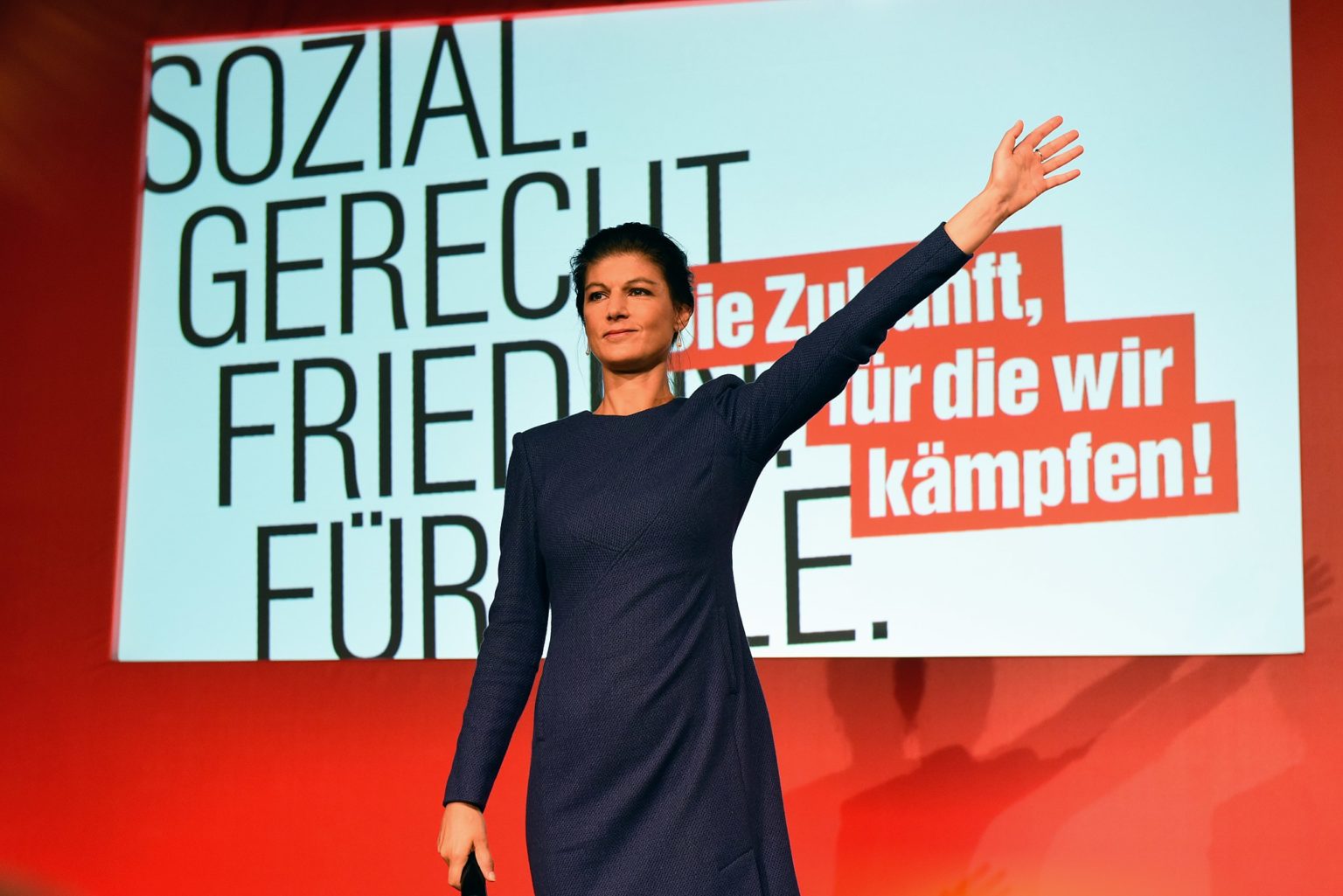If current polling holds up, the Green Party might soon lead the German government. But this change won’t be quite as radical as it might look to casual American observers. The Greens will largely absorb disenchanted voters of the two current ruling parties—the conservative CDU/CSU and the social democratic SPD, either of which might retain its hold on power as the Green Party’s junior coalition partner. As for the Greens themselves, they would only stand for continuity and offer little in terms of change (except perhaps by expediting the country’s transition to renewable energy production, which has so far cost German consumers dearly).
As Sahra Wagenknecht, a leading figure in the German party Die Linke (The Left), has noted in her new book—the provocatively titled Die Selbstgerechten (The Self-Righteous Ones)— the Greens are largely the party of the “academic middle class, software programmers, and marketing experts.” But while discontent with these representatives of the managerial strata is growing just as quickly in Germany as it is elsewhere in the West, the German political landscape offers very few viable alternatives. Wagenknecht’s own party claims to be one such alternative, but the same polls see it at only seven percent, nationally, two points fewer than in federal elections four years ago.
Wagenknecht lays the blame for this stagnation at the feet of what she calls a “lifestyle left” of mostly university-educated urbanites with “left liberal” persuasions that has captured her party no less than it has the Greens. This lifestyle left promises higher food and gas prices to combat climate change but has nothing to offer German workers in terms of better wages and job security. It is no wonder, she concludes, that these voters are increasingly turning toward the right-wing Alternative für Deutschland (Alternative for Germany)—just as much as working-class voters in America have turned out for Trump, in France for Marine Le Pen, and in Hungary for Viktor Orbán. These developments, Wagenknecht argues, are not evidence of racism on the rise, but rather that Die Linke has become alienated from the concerns of its traditional constituencies. To reverse course, Die Linke would need to defend the national sovereignty of the German state against global financial and corporate interests. This would mean reducing immigration to manageable levels in order to boost the bargaining power of low-wage workers.
Driven by “individualism and cosmopolitanism,” leftists have more in common with their globetrotting counterparts in other countries than with the working classes at home.
Wagenknecht’s new book has prompted outraged reactions from her comrades in Die Linke. She was waging “literal war against her own party” whose voters she “despises,” member of parliament Niema Movassat complained. A writer in the Linke-friendly newspaper Neues Deutschland added that Wagenknecht’s criticism of transgender and immigrant-rights activism threatened to repel the same young people whose concerns for these issues had politicized them to begin with. In perhaps the least persuasive contribution to the debate, the columnist Ingo Arend opined in the left-liberal newspaper taz that “symbolic” struggles for recognition by those occupying “marginalized” identities were, in fact, key to gaining political power.
What these predictable reactions to Wagenknecht’s attacks on economic globalization show is that likewise political ideologies and party programs have become thoroughly globalized. Criticisms similar to that of Movassat and Arend’s were made against Bernie Sanders in 2016 (whose own statement that open borders were “a Koch brothers proposal” Wagenknecht cites approvingly). Driven by “individualism and cosmopolitanism,” leftists have more in common with their globetrotting counterparts in other countries than with the working classes at home. In other words, as Wagenknecht quotes Jean-Jacques Rousseau, “Such philosophers will love the Tartars to avoid loving their neighbor.”
Such elite globetrotting lends itself to a greater homogenization of cultural expression. Antifascist-chic has certainly been one of the stranger contributions from the export-hungry Germans to the global village; conspicuously clad in black, Antifa has been a common sight on the German political scene for decades, drawing their legitimacy from the purported ubiquity of neo-Nazi activity. Its American counterparts can now be found bashing in storefronts as far away as Portland, Oregon. But, Wagenknecht observes, the actual number of individuals with retrograde views toward minorities has dramatically decreased. Whether the result of greater acceptance of inter-ethnic marriages, female autonomy, or homosexuality, poll after poll documents a significantly greater liberal outlook among Western populations.
Then what explains the urgency with which leftists are decrying an alleged rise in intolerance? In Wagenknecht’s view, it is a defensive form of class struggle. The “Golden Age” that saw massive growth rates across the Western economies after World War II also expanded educational systems, offering social mobility to many people traditionally barred from the upper-middle class through higher education. But because economic growth rates have been sluggish for decades, the university-credentialed parvenus are suddenly conscious of the threat of downward class mobility, and are therefore rigorously setting the boundaries to join their ranks. This, Wagenknecht explains, is “nothing new, but historically the norm. As social class boundaries become more porous, competition grows; by closing off access to those below, by contrast, it gets easier to secure the status gains for one’s own children.” Leaving non-academics behind in a state of baffled alienation through obscure and ever-changing speech codes is precisely the point, according to Wagenknecht. (Meanwhile, as if trying to prove Wagenknecht’s historical account of class dynamics correct, some of her comrades demanded that she refrain from running on the Die Linke ticket for the upcoming fall election; they were not successful.)
The narrowing of publicly acceptable opinion is on the rise in Germany just as much as it is in the United States. A recent campaign by a number of artists who satirized the government’s lockdown policies provoked massive outrage among opinion leaders, with one board member of the public-broadcasting system WDR even calling for the campaign’s members to be banned from its airwaves. That the demand received immediate pushback suggests that German democratic discourse has not yet fully crumbled, despite the fact that free speech rights have never been as absolute as in the United States (the government prohibits Holocaust denial, for example).
The German state also reserves the right to decide what is permissible in political discourse. Opinions believed to be in violation are subject to surveillance by the ominously-named Bundesverfassungsschutz (the Federal Office for the Protection of the Constitution), whose agents have been known to monitor Wagenknecht herself. Naturally, an opinion writer in the New York Times recently chimed in to say that the institution is worthy of imitation in America.
But rather than exporting its First Amendment, the United States has reciprocated Germany’s generous gift of Antifa-style politics with the expanded reach of its Silicon Valley tech monopolies—monopolies which now threaten to dominate public access to information in the European Union, as Wagenknecht documents in the book’s closing section. In general, Wagenknecht believes, neoliberal reform policies—which were first implemented the last time the Greens held federal power as the junior coalition partner of then-chancellor Gerhard Schröder’s SPD—“have moved us noticeably closer to American conditions.” She adds that “the images from the United States allow us to look into our own future as if through the looking glass.” It’s international rapprochement for all the wrong reasons.
An alternative internationalism is possible, one that adopts the best ideas from other countries, not their worst. While Germany should replicate the First Amendment (and maybe expand air conditioning, at least in its smelly, scorching subway cars), the United States has plenty to learn from the European power about managing labor relations. In fact, in a hopeful sign that what Wagenknecht derides as America’s “Manchester capitalism” is crumbling, US conservatives are now marveling at Germany’s “codetermination” model of corporate governance, which gives worker representatives a say in their company’s business decisions. As Wells King, the research director of the conservative think tank American Compass, optimistically notes, “a combination of works councils and board-level codetermination has shown positive effects on reducing short-termism in strategic decision-making and in reducing national income inequality” in Germany. The sectoral bargaining powers held by German workers are also worthy of emulation, Wells believes. In another encouraging sign, a clear majority of Americans supports such arrangements.
But the preferences of majorities rarely affect policy decisions anymore, Wagenknecht must qualify, because our institutions fundamentally distrust democracy. When France asked its citizens to vote on the ratification of the proposed EU constitution in 2005, 55 percent came out in opposition—but the then-EU leaders ignored the referendum and ratified the Treaty of Lisbon, anyway. And we know what the support of 69 percent of Americans for Medicare for All is worth on Capitol Hill.
The intra-left response to Wagenknecht’s book makes clear that she has no shot at realizing her political program within Die Linke any time soon. That said, the populist majorities could always break through again. As before, their supporters will be more likely be found among farmers demonstrating for lower diesel fuel prices than the urban intellectuals cruising past in electric vehicles (no thought horrifies the “lifestyle left” more). But nature abhors a vacuum, and if the traditional workers parties don’t want to lead the revolt, others most assuredly will.
And they already are, as Wagenknecht dryly observes. After all, Marine Le Pen’s party National Rally is calling for an end to President Emmanuel Macron’s austerity; Poland’s ruling Law and Order party, meanwhile, has enacted numerous laws expanding the welfare state, including providing generous child allowances, all in defiance of the EU’s narrow budget guidelines. The popularity of these parties is proof to many on the left of an ascendant far-right. But, Wagenknecht counters, this is a “magician’s sleight-of-hand,” which conjures up ghosts that aren’t there. It merely disguises the fact that the left has totally gone to bed with capital. Misery makes strange bedfellows indeed.









